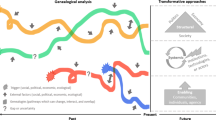Abstract
This paper is an evaluation of the sociological significance of the development and adoption of sustainable agricultural practices. The concept of “appropriationism” is introduced as a means of determining whether or not sustainable agriculture is an expression of class antagonisms in U. S. agriculture. “Appropriationism” is the process by which corporate agribusiness replaces natural processes with industrial products. A comparison of responses to farm crisis in the late 19th century and in the 1980s is employed as a heuristic device to determine the contemporary sociological significance of sustainable agriculture. Based on past experience and changes in key institutions over the past century, it is concluded that the development of sustainable agricultural practices will not significantly challenge the economic prerogatives of agribusiness and that the long-term process of the industrial appropriation of natural processes in agriculture will continue into the 21st century.
Similar content being viewed by others
References
Burbach, Roger and Patricia Flynn,Agribusiness in the Americas. New York: Monthly Review Press, 1980.
Burrowoy, Michael, “Toward a Marxist Theory of the Labor Process: Braverman and Beyond.”Politics and Society 8 (1978):247–312.
Bultena, Gordon, Paul Lasley, and Jack Geller, “The Farm Crisis: Patterns and Impacts of Financial Distress Among Farm Families.”Rural Sociology 51(4):436–448.
Buttel, Frederick H., “Biotechnology and Agricultural Research Policy.” Pp. 312–347 in Kenneth A. Dahlberg (ed.),New Directions for Agriculture and Agricultural Research. Totowa, NJ: Rowman & Allenheld, 1986.
Buttel, Frederick H. and Garth Youngberg, “Implications of Biotechnology for the Development of Sustainable Agricultural Systems.” Pp. 377–400 in William Lockeretz (ed.),Environmentally Sound Agriculture, New York: Praeger, 1982.
Cochrane, Willard W.,The Development of American Agriculture: A Historical Analysis. Minneapolis: University of Minnesota, 1979.
Danbom, David B., “Publicly Sponsored Agricultural Research in the United State from an Historical Perspective.” Pp. 107–131 in Kenneth A. Dahlberg (ed.),New Directions for Agriculture and Agricultural Research. Totowa, NJ: Rowman & Allenheld, 1986.
Douglass, Gordon K., “The Meanings of Agricultural Sustainability.” Pp. 3–30 in Gordon K. Douglass (ed.),Agricultural Sustainability in a Changing World Order. Boulder: Westview, 1984.
Edwards, Everett E., “American Agriculture — the First 300 Years.” Pp 171–276 inFarmers in a Changing World, 1940 Yearbook of Agriculture. Washington, DC.: Government Printing Office, 1940.
GAO (U.S. General Accounting Office),Farm Finance: Financial Condition of American Agriculture As of December 31, 1987. Washington, DC: GAO 1988.
Ginder, Roger G., Kenneth Stone, and Daniel Otto, “Impact of the Farm Financial Crisis on Agribusiness Firms and Rural Communities.” Pp. 298–321 in Joint Economic Committee,New Dimensions in Rural Policy: Building Upon Our Heritage. Washington, DC: U.S. Government Printing Office, 1986.
Goodman, David, Bernardo Sorj, and John Wilkinson,From Farming to Biotechnology: A Theory of Agro-Industrial Development. Oxford: Basil Blackwell Ltd., 1988.
Goodwyn, Lawrence,The Populist Moment: A Short History of the Agrarian Revolt in America. New York: Oxford University, 1978.
Hicks, John D.,The Populist Revolt: A History of the Farmers' Alliance and the People's Party. Minneapolis: University of Minnesota, 1931.
Kloppenburg, Jack Ralph Jr.,First the Seed: The Political Economy of Plant Biotechnology. New York: Cambridge, 1988
Lacy, William B. and Lawrence Busch, “The Changing Division of Labor Between the University and Industry: The Case of Agricultural Biotechnology.” Pp. 21–50 in J. K. Molnar and H. Kinnucan (eds.),Biotechnology and the new Agricultural Revolution. Boulder: Westview, 1989
Lockeretz, William, “Alternative Agriculture.” Pp. 91–311 in Kenneth A. Dahlberg (ed.),New Directions for Agriculture and Agricultural Research: Neglected Dimensions and Emerging Alternatives. Totowa, NJ: Rowman & Allenheld, 1986.
Mann, S. A. and J. M. Dickinson, “Obstacles to the Development of a Capitalist Agriculture.”The Journal of Peasant Studies 5(1978): 466–481.
McNall, Scott G. and Sally Allen McNall,Plains Families: Exploring Sociology through Social History. New York: St. Martin's Press, 1983.
Moore, Barrington Jr.,Social Origins of Dictatorship and Democracy. Boston: Beacon Press, 1966.
Morgan, Dan,Merchants of Grain. New York: Penguin, 1979.
Pfeffer, Max J., “Social Origins of Three Systems of Farm Production in the United States.”Rural Sociology 48 (1983): 540–562.
Phipps, Tim T., “Some Rays of Hope for Agriculture and the Environment.” Pp. 186–202 in M. Ann Tutwiler (ed.),U. S. Agriculture in a Global Setting: An Agenda for the Future. Washington, DC: Resources for the Future, 1988.
Seely, Ron, “Better Living Through Chemistry? Farmer Says No.”Wisconsin State Journal. Feb. 28, 1988:1–12.
Strange, Marty,Family Farming: A New Economic Vision. Lincoln: University of Nebraska Press, 1988.
Taylor, Carl C.,The Farmer's Movement: 1620–1920. New York: American Book Company, 1953.
Wilkening, Eugene and Jess Gilbert, “Family Farming in the United States.” Pp. 271–302 in Boguslaw Galeski and Eugene Wilkening (eds.),Family Farming in Europe and America. Boulder: Westview, 1987.
Additional information
Max Pfeffer is a sociologist at Rutgers University. His research and teaching interests span several areas, including agriculture and the environment, rural labor markets, rural to urban and international migration, and farmland preservation. Much of his recent writing and field work deals with different dimensions of social relations in rural/urban fringe areas.
Rights and permissions
About this article
Cite this article
Pfeffer, M.J. Sustainable agriculture in historical perspective. Agric Hum Values 9, 4–11 (1992). https://doi.org/10.1007/BF02217960
Issue Date:
DOI: https://doi.org/10.1007/BF02217960




